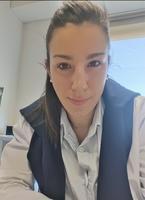- Personal menu
- Profile
- Phd thesis
- Research activities
- Training
- Publications
- Other activities
- Other content
Dott. Federica Sini
- SCIENZE VETERINARIE PER LA SALUTE ANIMALE E LA SICUREZZA ALIMENTARE
- Phd: 37th cycle
- Dottorato in Scienze Veterinarie per la Salute Animale e la Sicurezza Alimentare
- Matriculation number: 871714

Phd thesis
Flow Cytometric Panel and Liquid Biopsy to Identify Neoplastic Conditions in Canine Effusions
Serous effusions in dogs are a frequent clinical finding that may reflect inflammatory, infectious, or neoplastic diseases. However, differentiating between benign and malignant effusions, particularly the non-hematopoietic (NH) cell populations, including epithelial and mesothelial cells, remains one of the most significant diagnostic challenges. While cytology remains the gold standard for effusion analysis, its sensitivity is frequently limited, especially when distinguishing reactive from neoplastic mesothelium or determining the tumour origin.
The aim of this PhD project was to improve the diagnosis of canine cavitary effusions by applying a multimodal approach involving flow cytometry (FC), immunohistochemistry (IHC) on cell blocks, next-generation sequencing (NGS), and droplet digital PCR (ddPCR).
The first phase aimed to evaluate FC as a potential alternative to IHC on cell blocks for the immunophenotyping of NH cells, demonstrating a high agreement between the two methods using a panel including cytokeratin, vimentin, and desmin. Further markers—CD44, CALB2, WT1, PDPN and EpCAM—were tested to optimize the diagnostic accuracy and facilitate the discrimination between epithelial and mesothelial cells and between the benign and malignant populations.
Subsequently, the first genomic data on canine mesothelioma, a rare and genomically unexplored tumor, were obtained and analyzed. The sequencing of tumor biopsies revealed potentially relevant mutations for diagnostic and therapeutic use, paving the way for future veterinary oncogenomic studies.
Finally, the project addressed diagnostic challenges through liquid biopsy approach by developing a ddPCR assay to detect a recurrent mutation in canine pulmonary carcinomas, using the effusion fluid as a diagnostic matrix. This method showed both high sensitivity and specificity, highlighting the potential of minimally invasive approaches in molecular diagnosis.
Overall, this project enables and provides the basis for the incorporation of cytometric and molecular advanced techniques into veterinary diagnosis, contributing to overcome the main diagnostic challenges related to the analysis of canine effusions, particularly in NH neoplasms.
Research activities
National Congress attendance (as the first author)
- VIII Congresso Nazionale ISCCA, 2024 - VERONA (Italy) - Poster Prentation: Flow cytometric characterization of non-hemopoietic cells in canine and feline effusions. Sini F., Melega M., Cannizzo F.T., Miniscalco B., Valenti P., Riondato F.
- 77° Congresso SISVET, 2024 - PARMA (Italy) - Oral Presentation: Flow cytometric CD44 and CD45 expression to characterize non-hemopoietic neoplastic, reactive, epithelial and mesothelial cells in canine effusions. Sini F., Miniscalco B., Valenti P., Melega M., Poggi A., Goldoni M., Riondato F.
International Congress attendance (as the first author)
- Veterinary Pathology and Veterinary Clinical Pathology (ESVP/ECVP/ESVCP/ECVCP), 2023 - LISBON (Portugal) - Poster Presentation: Flow cytometric cd44 and cd45 expression in neoplastic and reactive non-hemopoietic cells in canine effusions. Sini F., Miniscalco B., Valenti P., Melega M., Poggi A., Riondato F.
Awards
Best Poster Research - Veterinary Pathology and Veterinary Clinical Pathology (ESVP/ECVP/ESVCP/ECVCP), 2023 - LISBON (Portugal). Flow cytometric cd44 and cd45 expression in neoplastic and reactive non-hemopoietic cells in canine effusions. Sini F., Miniscalco B., Valenti P., Melega M., Poggi A., Riondato F.
Pubblications (during the PhD period)
- Riondato F, Colitti B, Rosati S, Sini F, Martini V. A method to test antibody cross-reactivity toward animal antigens for flow cytometry. Cytometry A. 2023 May;103(5):455-457. doi: 10.1002/cyto.a.24691.
- Riondato F, Poggi A, Miniscalco B, Sini F, Marconato L, Martini V. Flow Cytometric Features of B- and T-Lmphocytes in Reactive Lymph Nodes Compared to Their Neoplastic Counterparts in Dogs. Vet Sci. 2023 May 26;10(6):374. doi: 10.3390/vetsci10060374.
- Martini V, Moretti P, Sini F, Ubiali A, Poggi A, Riondato F. Factors correlating with circulating T-zone-like cells of undetermined significance (TZUS) in dogs resident in Italy. Vet J. 2024 Jun;305:106143. doi: 10.1016/j.tvjl.2024.106143.
- Ubiali A, Cesar Conti L, Dall'Ara P, De Maria R, Aresu L, Moretti P, Sini F, Riondato F, Stefanello D, Comazzi S, Martini V. Exploring the dynamics of Programmed Death-Ligand 1 in canine lymphoma: unraveling mRNA amount, surface membrane expression and plasmatic levels. Front Vet Sci. 2024 Jul 26;11:1412227. doi: 10.3389/fvets.2024.1412227.
- Sini F, Melega M, Cannizzo FT, Miniscalco B, Valenti P, Riondato F. Flow cytometry of non-hematopoietic cells in canine effusions. Front Vet Sci. 2024 sep 24; 11: 14114271. doi:11. 10.3389/fvets.2024.1414271.




